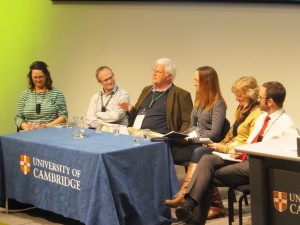SUNDAY, 17 APRIL 2016

Entitled Making a Difference in Conservation: Improving the Links Between Ecological Research, Policy and Practice, the conference covered an impressive range of topics from original conservation research to anthropology, economics, and politics – this last area represented by members of the Treasury, Welsh Government and other civil servants. Indeed only around 40% of attendees were scientists in academia! As perfectly stated by Amanda Smith (Natural England), “We’ve got to make conservation, not science, the goal”.
Professor John Altringham, conservation and bat expert from the University of Leeds, discusses the time-lag between science and practical conservation efforts:
For a scientific conference, there was a huge amount of focus on social science and it was met with approval by everyone involved. Clearly, when trying to influence the public and policy-makers’ behaviour, one cannot ignore the fact that they are complex human beings, who do not always behave rationally. Surprising key words that came up for discussion time and time again were Value, Power, Trust & Relationships.
These words were particularly important when discussing the resolution of conflict – an unfortunately common occurrence in conservation. However, Juliette Young (Centre for Hydrology & Ecology) recommends that we should look at environmental conflicts as an opportunity rather than a barrier. Engaging with stakeholders on the ground is a necessity if conservation efforts are to be both effective and sustainable. Jilly Hall from Natural England, the government’s conservation arm in this part of the world, highlighted the skills needed to talk to people facing conflicts between environmental and social priorities, during a fantastic workshop during the conference. Using tactics of reasoning, understanding and even risk-sharing, as opposed to aggressive confrontation, she suggests, is far more productive.
Incorporating local knowledge not only helps with conflict resolution but can be a significant wealth of information, yet often largely ignored by those at the top. “I wonder if we recognise the tens of thousands of farmers in our own country as indigenous experts”, reflected Peter Brotherton (Natural England) in the closing discussions. This, of course, also includes indigenous knowledge in other parts of the world, with likely far higher species richness. Pernilla Malmer (Stockholm Resilience Centre) points out that such knowledge can often span time periods impossible to achieve through science, illustrated nicely in Kenya by Serah Munguti’s (Nature Kenya) talk.
Serah Munguti, advocacy manager for Nature Kenya, discusses human-wildlife conflict and the importance of understanding the views, values and priorities of each stakeholder when dealing with conservation issues:
Putting a value on ecosystem services, a contentious suggestion, may be the best way to integrate the challenges of environmental degradation and economics. Bluntly pointed out by Ian Bateman (University of Exeter), with every conservation proposal suggested to George Osborne, there’s an advisor whispering £3 billion, £1.5 billion.. in his ear.
Professor Ian Bateman, environmental economist at the University of Exeter, talks to BlueSci about why we should be putting a monetary value on nature to ensure its protection:
Mark Burgman, the final speaker of the conference, perhaps represents what the meeting was striving towards. He’s an academic who previously researched conservation science for 15 years at the University of Melbourne, producing models that “nobody was taking any notice of”. He then founded a new team within the federal government, and after 3 years of adjusting and figuring out how they could work together, they now let policy-makers specify what they will investigate. The result? Their work is finally making the impact it ought to, as they are now providing answers to the questions that are directly relevant to policy-makers, rather than telling them what evidence they should be taking into consideration.
Professor Bill Sutherland, key organiser and Miriam Rothschild Chair of Conservation Biology at the University of Cambridge, reflects on the conference and future methods for improving links between science, policy and practice in conservation:
A recurring message over these three days was that scientists and practitioners must engage with the press and media more than they are doing. This was made particularly clear by Fiona Fox (Science Media Centre) who urges the relevant experts to talk to the press, and even helps them to do so, because of the influence they can have on the public and policy-makers’ views of scientific issues. As Maddie Stone has pointed out on twitter: “Declining interviews because you think the reporter will get the story wrong makes it more likely he or she will”, and this can only lead to trouble for science and conservation, as it so often does.
This conference has made one thing quite clear: conservation does not work by simply asking scientific questions and implementing practices based on the answers. There is so much more involved. Hence the complex range of approaches to conservation seen across this conference. Understanding and accounting for the behaviour of people is crucially important, as at the end of the day, we are not really dealing with environmental problems, we are dealing with human problems.
The BlueSci Radio show will be covering the BEScci conference on Thursday 21st April at 8pm on CamFM 97.2 to continue the discussions. Listen in online here.
To see more from the conference search #BEScci on twitter.
BlueSci would like to say a big thank you to Bill Sutherland, the interviewees, the British Ecological Society, and Dr Simon Caporn for the opportunity to be part of this great conference.
